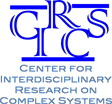Overview
CIRCS fosters collaborations between researchers from different scientific and engineering disciplines who share a common interest in elucidating fundamental aspects of the structure and function of complex physical and biological systems across multiple levels of organization using a combination of quantitative state-of-the-art experimental and theoretical research tools, and enhances interdisciplinary educational training of both undergraduate and graduate students through its various activities.
CIRCS members consist of faculty members, postdocs, undergraduate and graduate students from various departments across colleges at Northeastern University as well as outside members from other institutions involved in collaborative research projects. Interactions are fostered through formal and informal interdisciplinary seminar series, conferences, and direct collaborations between various members.
Ongoing research projects span biomolecular systems, physiological systems from neuroscience to cardiac nonlinear dynamics, nanosystems from nanomaterials design to nanotribology, and complex interfacial systems in materials science from microstructural pattern formation in alloys to crystal decohesion and crack propagation.
Alain Karma in News

Alain Karma received Bruce Chalmers Award
CIRCS director Alain Karma is awarded the 2008 Bruce Chalmers Award by TMS (The Minerals, Metals & Materials Society) for his interdisciplinary work at the interface of physics and materials science. Award citation: “For his many outstanding and innovative contributions to the science and technology of solidification and for providing exceptional insight into the fundamentals of microstructure evolution”. Bruce Chalmers Award: The Bruce Chalmers Award was established in 1989 by the Materials Processing & Manufacturing Division of TMS and is named for Bruce Chalmers, widely acknowledged as the father of modern solidification science. The award recognizes outstanding contributions to the field of solidification science.
Upcoming Events
New bioinformatics approach identifies genes involved in complex diseases
In a paper published in npj Systems Biology and Applications, the Karma group and colleagues describe their discovery of previously unknown genes implicated in heart failure. The team confirmed that one of those genes plays a causal role in cardiac hypertrophy—abnormal thickening of the heart muscle—which can lead to heart failure. This discovery was enabled by a new bioinformatics methodology that is more broadly applicable to search for genes involved in complex diseases and to predict whether individuals suffering from a particular disease will respond to a given drug treatment. For more information, see the link to the article and news release.
